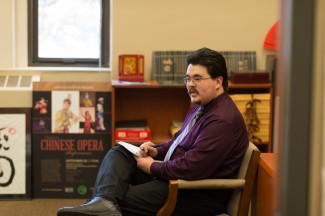Confucius Institute, students learn about Chinese language, culture
Over 2,000 years ago, Confucius left a legacy of loyalty, morality and harmony in China that has since extended to all corners of the world — even coming as far as the University of Idaho.
An educator, philosopher and politician, Confucius is revered as an important philosophical figure by millions around the globe.

Philip Vukelich | Argonaut
Dusty Fleener, administrative coordinator at the University of Idaho Confucius Institute, takes notes during an informal meeting in the institute office on the third floor of the Administration Building Thursday.
Matthew Wappett, the recently appointed co-director of the UI Confucius Institute, said the institute is named after Confucius because he’s a model and symbol for what the organization embodies.
He was hard working, loyal, positive and harmonious, Wappett said.
The Confucius Institute is an exercise of cooperation between China and the U.S., said Hexian Xue, the other co-director of the institute. He said there are over 400 chapters around the world and nearly 100 in the U.S. alone.
Xue said the Confucius Institute at UI is one of the newest, and has found its home on the third floor of the Administration Building.
The purpose of the Confucius Institute is to teach Chinese language and culture to people of all demographics. The institute offers Chinese language programs along with an assortment of other classes such as Tai Ji — a Chinese philosophy.
One of the elements of the institute is to build stronger ties with China. Each institute chapter has a partner in China, with whom they exchange teachers, ideas and support, Xue said. UI’s partner school is the South China University of Technology.
UI and a Chinese company called Han Ban work together to fund the local Confucius Institute — half of the funding comes from UI and half comes from the educational outreach program attached to the Ministry of Education in China, Wappett said.
The Confucius Institute at UI has three missions it hopes to achieve in the future.
The first is to promote Confucian principles of mutual understanding between China and the other countries that have chapters, and the second is to spread knowledge of Chinese culture and language, Xue said.
While all Confucius Institutes share the first two missions, Xue said the third mission is specific to Idaho — to spread the knowledge of the existing ties between Idaho and China.
Chinese people have been in Idaho for over a hundred years, Wappett said.

Philip Vukelich | Argonaut
The Confucius Institute’s mission is to build Chinese language and culture in Idaho.
The strong connection between Idaho and China is the main topic of the institute’s upcoming event series, China on the Palouse. The event will be a seminar featuring visiting Chinese scholars and local faculty who will showcase their studies and works in related fields.
The seminars start Oct.. 15. Wappett said the seminars will be held in the Idaho Commons at 6 p.m. every other Wednesday.
Xue said the Confucius Institute plays a pivotal role in promoting an effective relationship between China and the rest of the world. In an era of increased globalization, it is paramount to learn more about other cultures, Xue said.
He said there are many Western fears and misunderstandings about China — that China has been closed off and people have not had a chance to understand what China is like, Wappett said.
He said the Confucius Institute strives to close the gap and bring a mutual understanding between the countries and their constit- uencies to promote a more promising future for all.
Macklin Brown can be reached at [email protected]
